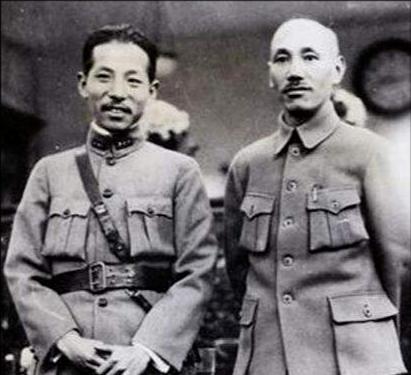History has its own life, it is like a person, both easy-going and self-respecting. ——Yu Qiuyu
At the beginning of 1931, the Central Plains War in several fluctuating provinces had come to an end.
At this time, China was dominated by two major military giants composed of Chiang Kai-shek and Zhang Xueliang, and powerful politicians such as Wang Jingwei, Feng Yuxiang, Yan Xishan, Li Zongren, and Bai Chongxi had all been hit hard and fled overseas.
Who knows, this stable situation lasted only a few months before Chiang Kai-shek stirred up new waves because of Chiang Kai-shek's house arrest of Hu Hanmin, the head of the legislative yuan.
Subsequently, political figures sympathetic to Hu Hanmin and distaste for Chiang Kai-shek regrouped in Guangzhou and formed a new "National Government."
But Chiang Kai-shek does not seem to care about the "nonsense" of these defeated generals, he is more concerned about the Workers' and Peasants' Red Army led by the Communist Party.
In July 1931, Chiang Kai-shek concentrated an army of 300,000 and personally served as commander-in-chief to launch a third encirclement and suppression of the Central Soviet Region.
What about Zhang Xueliang's side? His trouble is even greater!

Zhang Xueliang and Chiang Kai-shek
In May 1931, just half a year after Zhang Xueliang was inaugurated as deputy commander-in-chief of the National Revolutionary Army's Army, the saboteurs under the command of the Japanese Kwantung Army created a new incident, the "Wanbaoshan Incident".
Clear-eyed people can see that the invasion of the northeast by the Kwantung Army is imminent.
To this end, Zhang Zuoxiang, who was acting as commander of the Northeast Border Defense Army, personally went to Beiping in July of that year to persuade Zhang Xueliang to quickly return to the northeast.
However, the sudden rebellion launched by Shi Yousan disrupted the Position of the Northeast Army.
Shi Yousan
Shi Yousan, also spelled Han Zhang, was born in Changchun, Jilin in 1891.
In the early years, due to poverty, he went out to join the Beiyang Army, and was later transferred to Feng Yuxiang's account.
With his alertness and fierceness and excellent means of leading troops, Shi Yousan was appreciated by Feng Yuxiang.
By the outbreak of the Northern Expedition, Shi Yousan had been promoted to commander-in-chief with nearly 30,000 troops, and his troops, together with Sun Liangcheng and Han Fuyu, were known as the three main forces of the Northwest Army.
Like Han Fuyu, with the continuous expansion of strength, Shi Yousan also began to seek the way of "independent development".
To this end, he did not hesitate to rebel against Feng Yuxiang three times, one against Yan Xishan, and one against Chiang Kai-shek.
Later, it was Zhang Xueliang who, in order to restrain Feng Yuxiang and Yan Xishan, asked Chiang Kai-shek to re-incorporate them.
Since then, Shi Yousan has been stationed in more than twenty counties in southern Hebei centered on Shunde, and it can be regarded as having a relatively stable base area.
Although he used his status as a fellow villager to defect to Zhang Xueliang, and Zhang Xueliang also tried his best to entrap him, after all, he was not a concubine of the Northeast Army, so Shi Yousan often had doubts.
It was also at this time that the Ningyue confrontation that broke out because of Chiang Kai-shek's imprisonment of Hu Hanmin took place.
In order to unite the anti-Chiang forces on all sides, the Guangdong side sent special personnel with 500,000 oceans and the title of commander-in-chief of the Fifth Army to lobby Shi Yousan.
So on July 18, 1931, Shi Yousan took advantage of the favorable situation in the south to launch a military operation to expel Zhang Xueliang.
Unbeknownst to him, Zhang Xueliang had already detected Shi Yousan's rebellion.
To this end, as early as May, he dispatched six defense brigades from the northeast to deploy on the Pinghan and Jinpu lines.
On the Nanjing side, Chiang Kai-shek also ordered Liu Zhi to command three legions to go north to attack Shi Yousan.
Shi Yousan stole chickens and did not become a corrosive rice, and the battle was completely defeated by the whole line until July 31.
Prisoner photo
At the end of the war in North China, the second entry with the Northeast Army was reopened, which made the Japanese ecstatic.
According to Zhang Xueliang's "Telegram to the Ministry of Foreign Affairs on the Situation in Northeast China", "At that time, the Second Division of the Japanese Army had 14,760 troops, 5,400 garrisons, 2,561 gendarmerie detachments, 52 aircraft, 1,100 personnel, 1,483 policemen in the railway sector, and a total of 3,051 policemen affiliated with the consulate. ”
In this way, Japan's adjustable troops in the northeast have exceeded 20,000.
And the Northeast Army?
Before the Central Plains War, Zhang Xueliang nominally had 400,000 troops.
Among them, in Liaoning Province, where the Japanese army was concentrated with more than 20,000 people, the Chinese army had about 170,000 troops.
After the Battle of the Central Plains, Zhang Xueliang took away 70,000 main troops.
When Shi Yousan rebelled, Zhang Xueliang transferred another 40,000 northeast troops, leaving only more than 60,000 people in the main force of the northeast army outside Guanwai.
In this comparison, the 6,800 Northeastern Troops of the Seventh Brigade stationed in Fengtian were at an absolute disadvantage in terms of equipment and numbers.
Therefore, the Japanese Kwantung Army decided to take advantage of this opportunity to concentrate its forces to launch a surprise attack.
(The material comes from the Network The copyright of the graphic and text belongs to the original author If there is any infringement, please contact to delete)